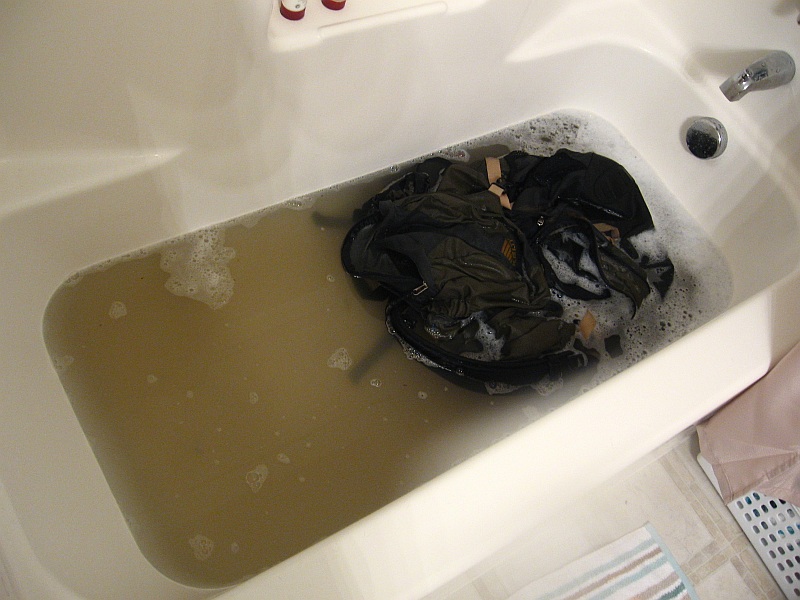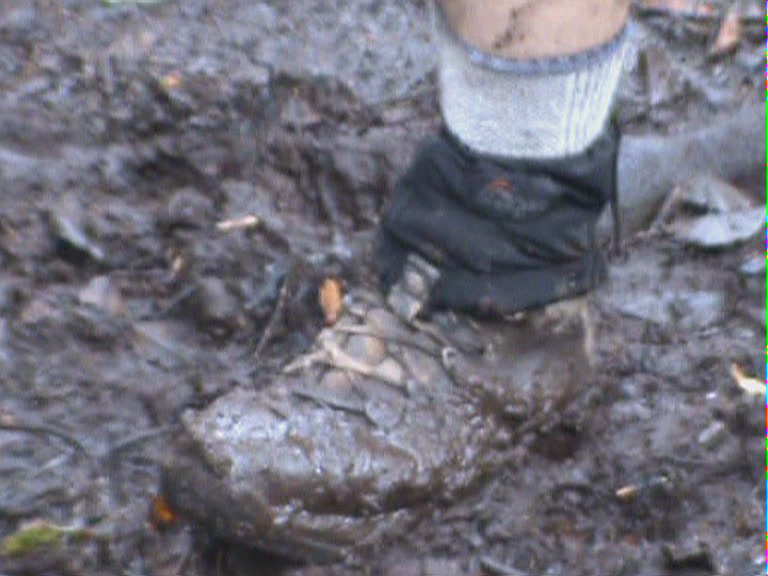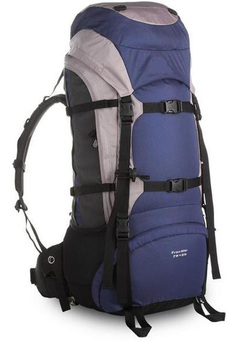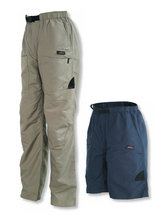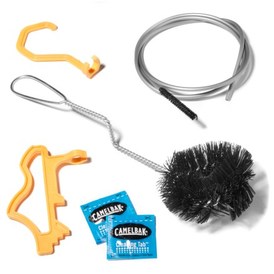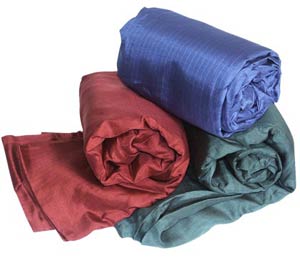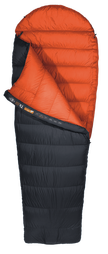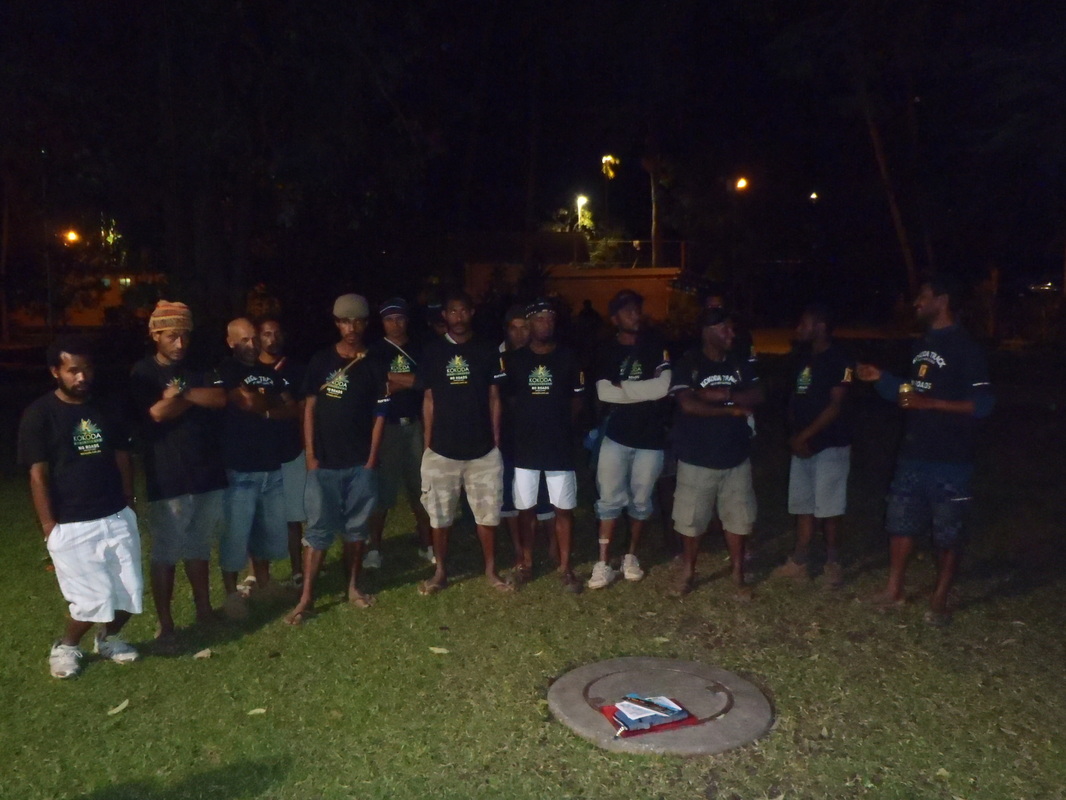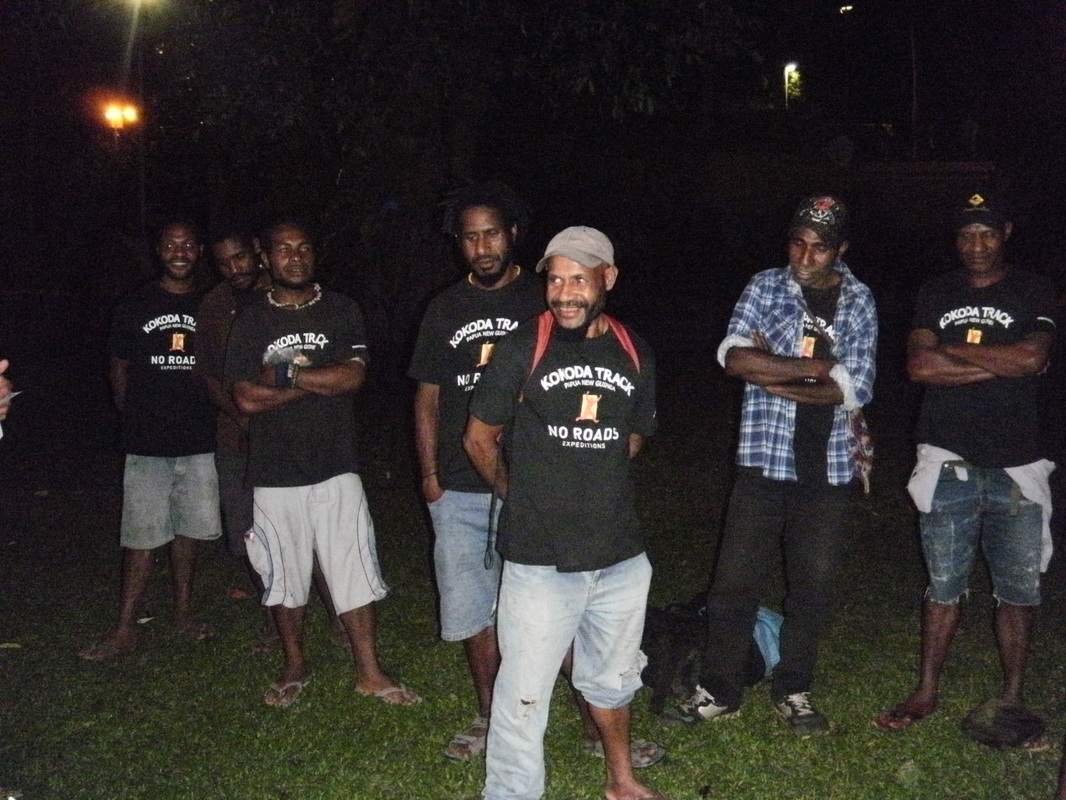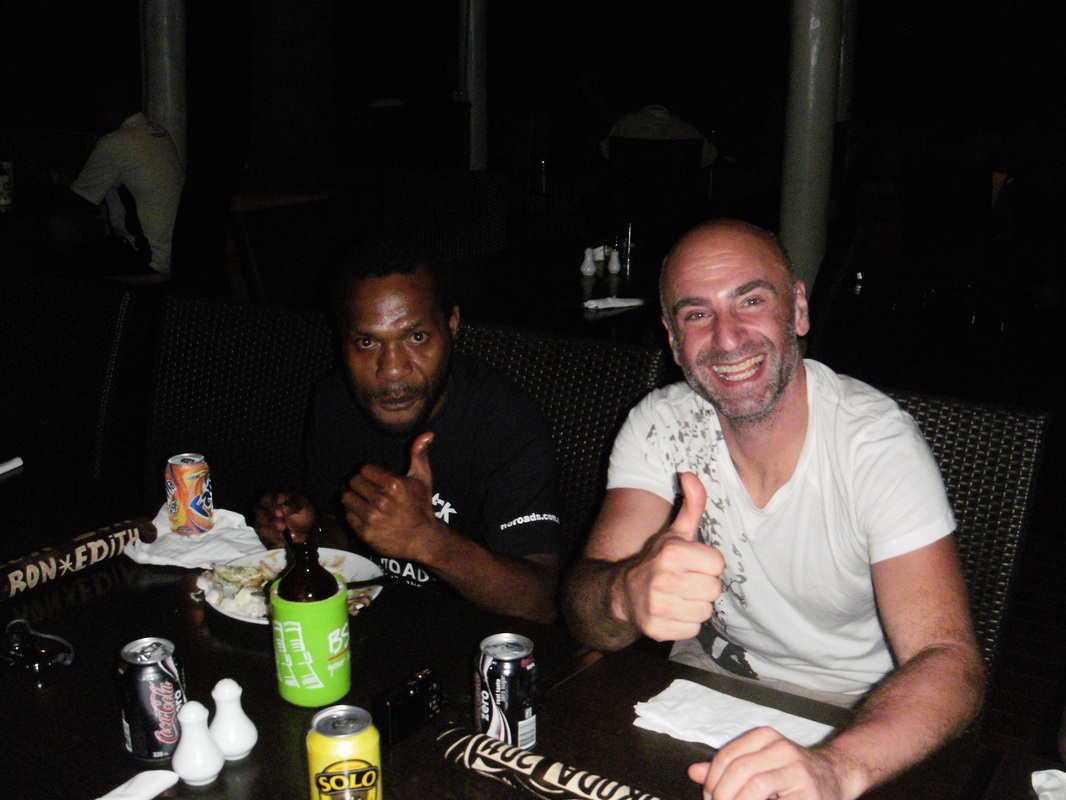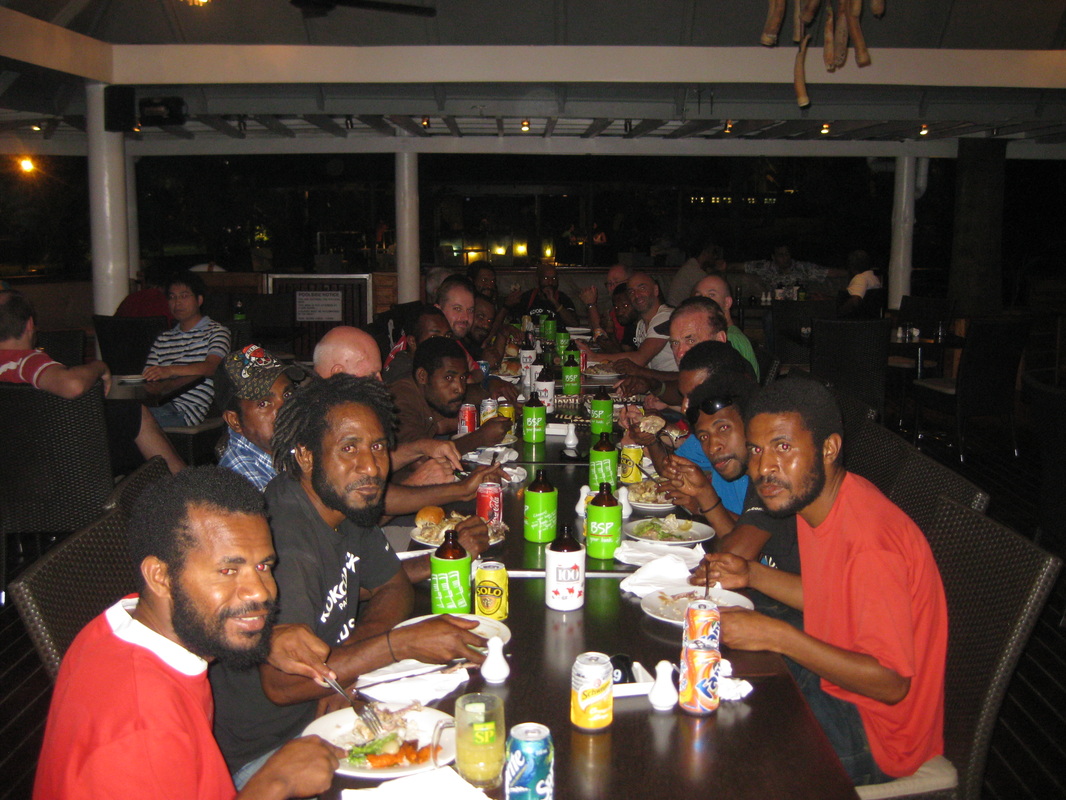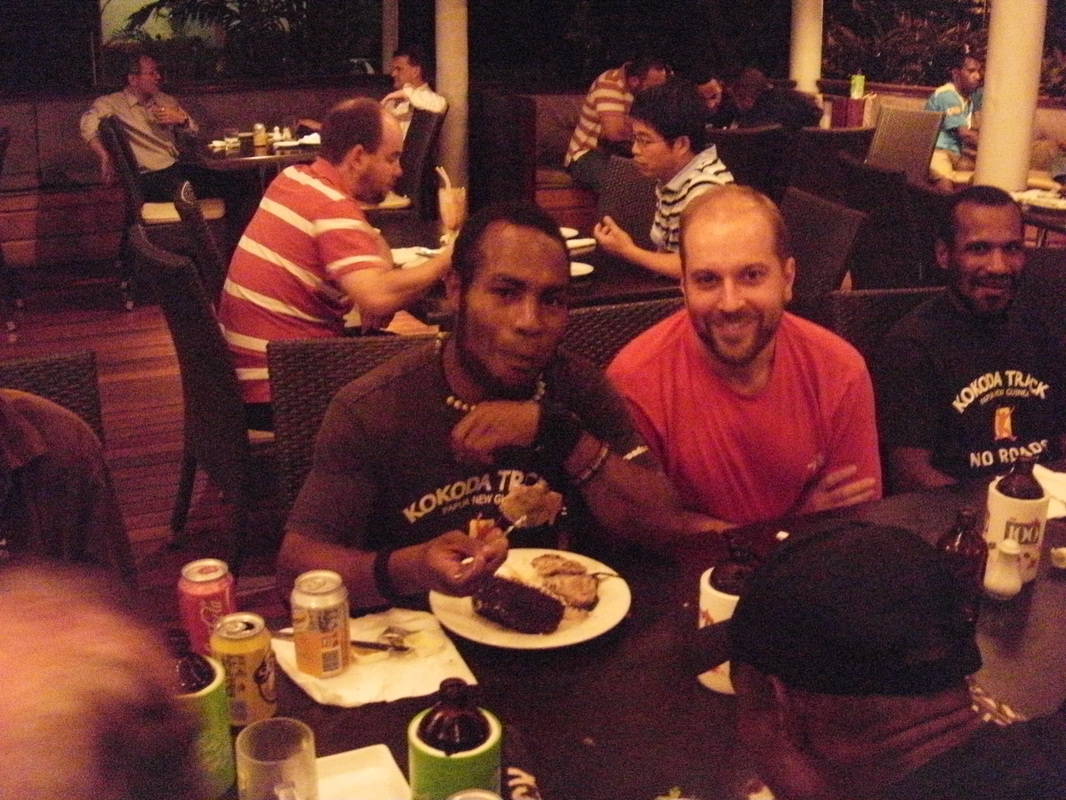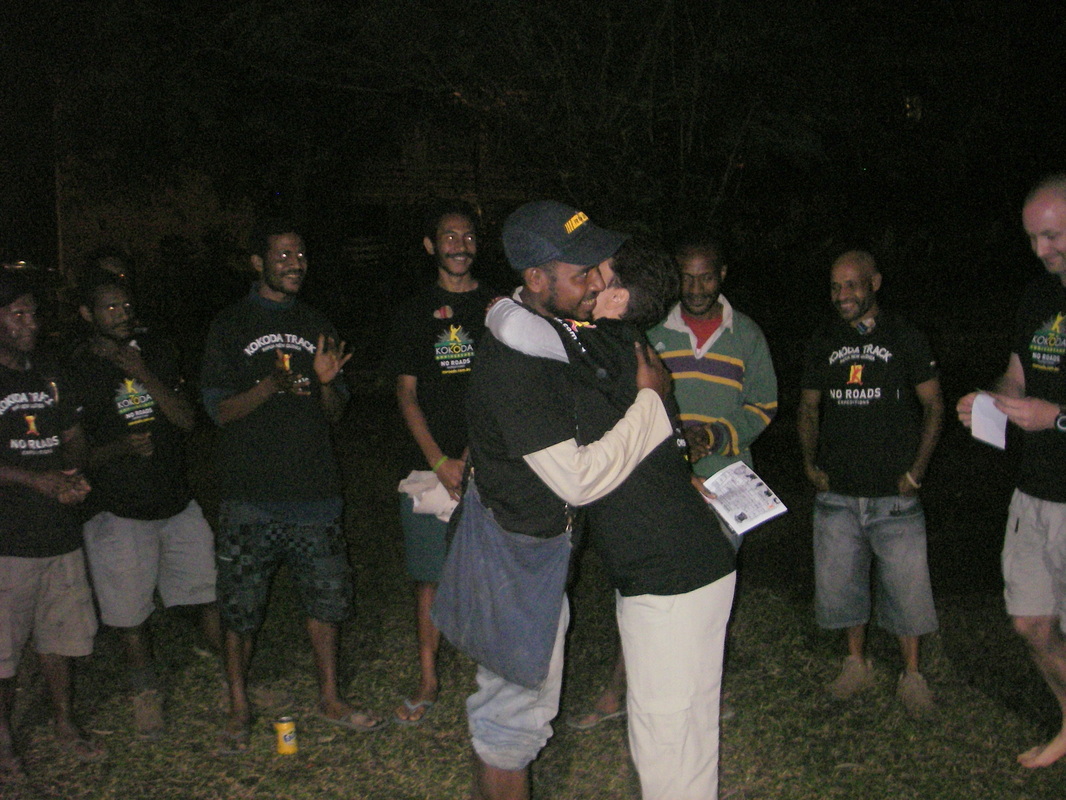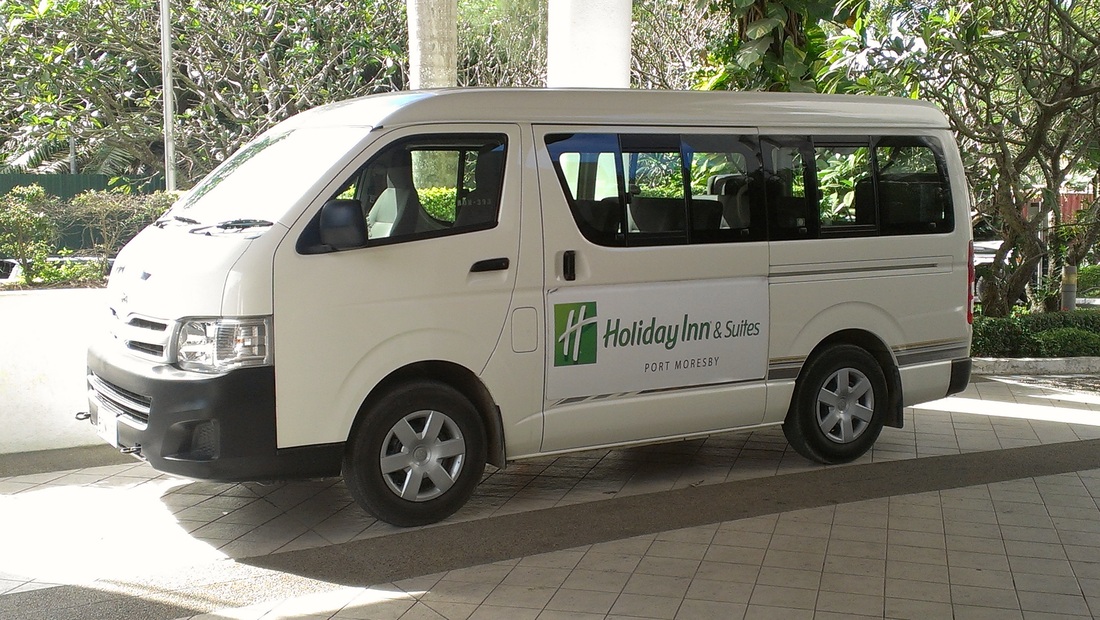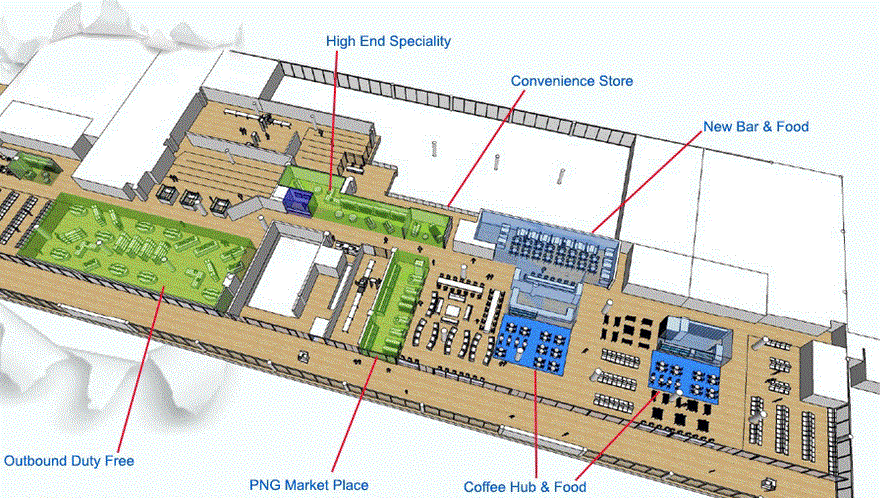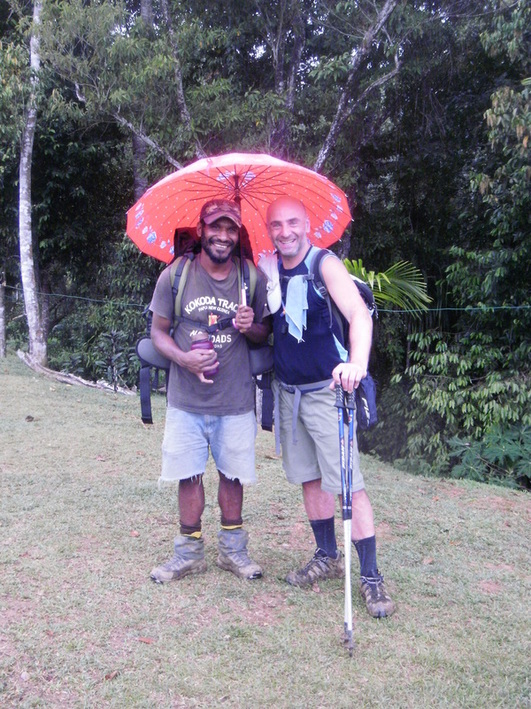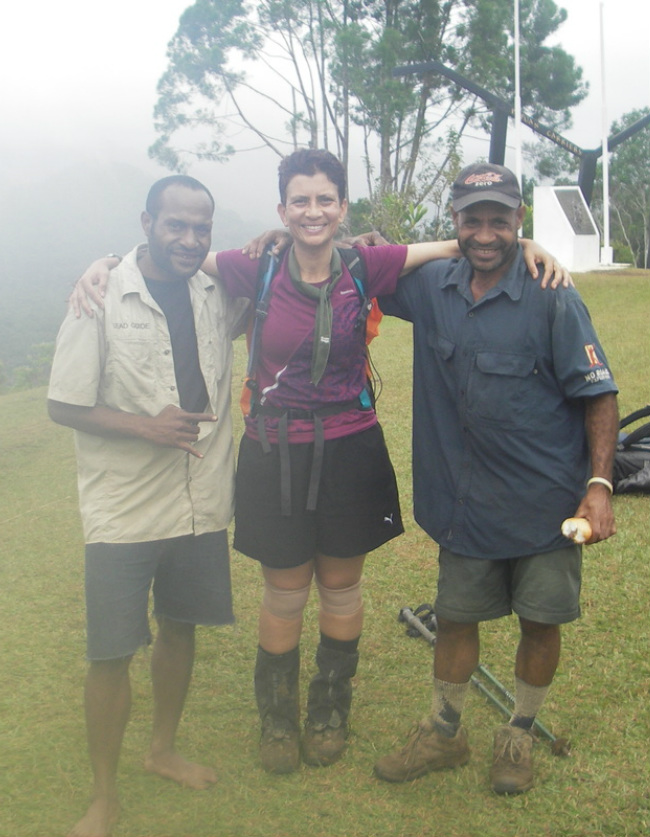After Your Trek
|
You will make it to the end and it will be an amazing experience. These pages contain advice, hints and tips that will assist you over the last few days of your expedition covering the days back in Port Moresby through to your journey home from PNG.
Your expedition guide will also provide you with this type of information during the post trek dinner and assist you where possible to your connecting flight home. Typically most trekkers from the same expedition fly out together on similar flights. In this section you will find information about:
|
|
Arrows may not center when in edit mode. Once site is published, the arrow will be centered on the tab
When the site is published, this border and note will not show up.
Drag & drop your tab 1 content here
Cleaning Your Trekking Equipment
Not the most exciting or interesting topic, but one that you will be interested in when you finish your trek and especially when you get home and open your backpack for the first time since trekking. (You may need a nosepeg!)
This information is general advice. You should always read and follow the manufacturers advice on how to best clean your gear.
This information is general advice. You should always read and follow the manufacturers advice on how to best clean your gear.
Hotel Etiquette
|
No Roads Expeditions would like to stress the importance of not making a huge mess at the hotel in your rooms cleaning your gear. The expedition guide will remind you of this.
It is for the simple reason that No Roads sees the hotel as a valued partner who could at any time charge us all significantly more for rooms based on the extra cleaning required because of the mess that some trekkers (from other companies) have left. Lets lead by example and maintain No Roads good name with the hotels. |
Boot Cleaning
|
Stinky, muddy, wet? In order for you to re-enter your home country you WILL need to clean your boots to remove all traces of mud or undergrowth. Customs will ask to see your boots and if they are not clean enough, they will make you clean them on the spot.
Luckily the hotels we use have a boot cleaning service capitalising on the huge number of trekkers that come through. Check with your expedition guide on the process and cost. It is usually something like 20 kina and if you put them in for cleaning when you arrive back in the hotel on trek day eight, they should be ready that night or the next morning. When you arrive home, you may wish to clean them again before storing them away for another day. You have just given them a fair pounding and they will appreciate some TLC. |
Cleaning your Backpack
|
You will have noticed the bottom of your backpack is pretty dirty and the rain cover may have some mud on it also. Just like with your boots, you must remove all dirt and dried mud from your backpack and cover. Customs may ask to check your packs and force you to clean them if they see dirt or mud.
If you clean your pack in the hotel bath or shower in your room please wipe up and wash away any mud/dirt that is washed off your backpack. Regardless of what base material it is made of simply scrub the pack down using a scrubbing brush with a mild detergent/soap in warm water then hose or rinse off. The pack will then dry easily if hung outside. When you arrive home you can help remove the smells from your backpack by airing it outside for a few days. Mildew can be a problem particularly if you have stored your pack wet. The best advice here is simply don't let it happen! |
Cleaning Trekking Clothing
|
The first clean to get them less smelly for the trip home is to simply give them a wash in the bath at the Hotel, or arrange for the hotel laundry to do them for you. The Holiday Inn has a washing machine available to hotel guests. If you do use the Hotel bath please do not make a mess.
When you arrive home, wash your clothes straight away (don't leave them in your pack for days) following the care instructions on the garments and allow them to air out on the washing line for a while. You may find they still smell a bit but after a few washes they should be okay. |
Hydration Bladder Cleaning
|
Any hydration bladder will need regular cleaning. You may even see visible growth of fungus or bacteria and especially if you don't rinse it and dry it immediately after use.
A full clean at home is recommended after your trek. Some hydration packs have special cleaning kits that include flexible brushes for the hoses and tablets to drop into the bladder to clean it. Cleaning kits can also be purchased separately. Most reputable brands of hydration bladders have detailed cleaning instructions on the packaging. If you have lost these, type into google.com.au or similar "how to clean my hydration bladder" and you will find many good answers. It is important to always make sure you dry your bladder before storage. |
Cleaning Silk Liners
|
Follow manufacturers care instructions carefully. Don't pack away wet/damp.
Silk is a very delicate fabric and your silk sleeping bag liners can be easily damaged by washing with harsh detergents or harsh wash cycles. Please be gentle. You can machine wash it, but do it separately so it doesn't snag on other clothes. Use a mild detergent with NO bleach, and wash on the most delicate setting. Wash your sleeping bag liner before use. Or hand wash with mild soap - dish washing liquid, shampoo or a bar of soap is fine. Lay flat or hang to dry - dries fast. Do not tumble dry. |
Cleaning your Sleeping Bag
|
Same advice as silk liners; follow manufacturers care instructions carefully. Don't pack away wet/damp. Hopefully your sleeping bag is not very dirty and only suffering from extended use over the eight days. A good airing may be sufficient.
Some sleeping bags, especially ones with down fillings, require careful washing and drying procedures so pay particular care to the instructions. Manufacturers often recommend drying your sleeping bag by lying it flat rather than hanging it. If you have a down bag you will need to fluff the down several times during the drying process to avoid clumping. |
Drag & drop your tab 2 content here
Post Trek Dinner with our Guides
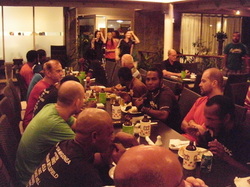
Final night dinner with the porters
After the expedition when you arrive back at the Hotel, you will spend the night dining with our Australian guides, guides and other friends you have made on the Kokoda Track.
This dinner is designed to provide you with an opportunity to have one last dinner together as a group, to relax and celebrate completing the trek, and to be with the guides one last time.
Some highlights may include the guides singing, presentations and recalling the funny stories during the expedition.
The guides buffet meal and soft drinks are paid for by No Roads Expeditions. The guides are asked not to have alcohol until after the dinner and presentations.
Please view more information on tipping the guides, and donations of clothing or equipment.
This dinner is designed to provide you with an opportunity to have one last dinner together as a group, to relax and celebrate completing the trek, and to be with the guides one last time.
Some highlights may include the guides singing, presentations and recalling the funny stories during the expedition.
The guides buffet meal and soft drinks are paid for by No Roads Expeditions. The guides are asked not to have alcohol until after the dinner and presentations.
Please view more information on tipping the guides, and donations of clothing or equipment.
Drag & drop your tab 3 content here
Tipping PNG Guides
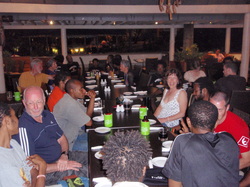
Having dinner on the final night
If you would like to show your appreciation to the local team you may show it by providing a tip. A usual tip is approximately 80 kina, or roughly $35 though this is at your discretion. Please give the tips to the Australian guide who will then distribute them at the last dinner.
Note: The above mentioned tip is distributed to all the group guides, not to the personal guides. If you hired a personal guide and wish to give him a tip also, that will be at your discretion and you can give that tip directly to the personal guide.
Please mention particular team members for good or bad performance to the Australian guide.
Note: The above mentioned tip is distributed to all the group guides, not to the personal guides. If you hired a personal guide and wish to give him a tip also, that will be at your discretion and you can give that tip directly to the personal guide.
Please mention particular team members for good or bad performance to the Australian guide.
Donating Gear to Guides
The local team also appreciates gifts. If you like you can give them shoes and clothing at the end of the expedition, even if they are not cleaned. Over the years we have seen some extremely generous donations of trekking gear and equipment to our guides following the completion of treks. Some of our trekkers have indicated that they were so pleased with their personal porter and the guide team in general that they wanted to give them more than just a tip. You are in no way obliged to donate any of your gear but if you do, it will be appreciated.
If you wish to donate anything to the guides please first chat with the expedition guide to discuss how this should be done. Typically this is arranged to occur on or after the final dinner on the last night at the hotel in Port Moresby.
The No Roads office in Melbourne does not collect items at the office to send to the guides. If you decide you wish to donate something to the guides or the people along the Kokoda Track we would highly recommend you consider supporting one of the projects of the No Roads Expeditions Foundation (NREF). You could also make a donation to the No Roads Education project.
If you wish to donate anything to the guides please first chat with the expedition guide to discuss how this should be done. Typically this is arranged to occur on or after the final dinner on the last night at the hotel in Port Moresby.
The No Roads office in Melbourne does not collect items at the office to send to the guides. If you decide you wish to donate something to the guides or the people along the Kokoda Track we would highly recommend you consider supporting one of the projects of the No Roads Expeditions Foundation (NREF). You could also make a donation to the No Roads Education project.
Exchanging Contact Details
Our PNG Guide team members are such wonderful people and a strong bond is often formed between the guides and trekkers, especially if you hired a personal guide. To avoid any complications or confusion around expectations, we strongly recommend that you do not provide your personal contact details or offers of special assistance.
Our recommendation is to consider supporting one of the projects of the No Roads Expeditions Foundation (NREF).
Our recommendation is to consider supporting one of the projects of the No Roads Expeditions Foundation (NREF).
Drag & drop your tab 4 content here
The Return Flight Home
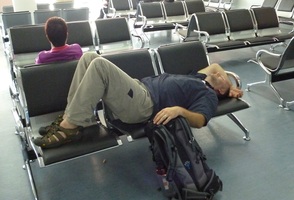
Exhausted - time for a nap
Heading home may involve one or more flights to reach your destination. The first flight for most people is the international flight out of Port Moresby. To ensure this leg of your journey is successful and as hassle free as possible follow these basic tips below.
Flight Confirmation
It is your responsibility to confirm your return flight bookings and departure times. In most cases this will be a formality and the Expedition Guide may be able to assist you.
You can use the hotel phone (your cost) or the pay-phone in the lobby, or the internet enabled computers in the Business Centre next to the Hotel lobby.
Flight Confirmation
It is your responsibility to confirm your return flight bookings and departure times. In most cases this will be a formality and the Expedition Guide may be able to assist you.
You can use the hotel phone (your cost) or the pay-phone in the lobby, or the internet enabled computers in the Business Centre next to the Hotel lobby.
- Airlines PNG - http://www.apng.com/
- Virgin Blue / Pacific Blue - http://www.virginblue.com.au/
- Qantas / QantasLink - http://www.qantas.com.au/
- Air Niugini - http://www.airniugini.com.pg/
Book Transport to Airport
The hotel courtesy bus operates on a schedule leaving at specific times during the day. If your flight is very early (some can be 7am) you should ensure you book spots on the Hotel bus ASAP the night before and allow time for check-in etc. at the airport. The Hotel bus typically departs every hour from the Hotel, but for very early departures discuss with the Hotel reception personnel.
The local taxi services are not recommended so if you need help please ask the Expedition Guide at the final dinner for assistance.
It would be wise to allow for up to a 30-45 minute delay in getting to the airport when planning your check-in time. You will be competing with other hotel guests for seats and possibly other trekkers from your expedition. The transport time from the hotel to the airport is typically 20 to 25 minutes for a good run without any delays.
The local taxi services are not recommended so if you need help please ask the Expedition Guide at the final dinner for assistance.
It would be wise to allow for up to a 30-45 minute delay in getting to the airport when planning your check-in time. You will be competing with other hotel guests for seats and possibly other trekkers from your expedition. The transport time from the hotel to the airport is typically 20 to 25 minutes for a good run without any delays.
Preparing for Customs
As you enter the Port Moresby International terminal you will pass through a security station with an X-Ray machine. As discussed in the section on cleaning, you may need to open your bags for inspection as per normal protocols at any International airport, but this is highly likely when returning to your home country.
Passengers arriving in Australia (and other countries) will also pass through customs. Australian Customs will sort you into different lines for passengers with items to declare. It is wise to declare that you MAY have items with dirt on them (tick yes to declare) and when you speak to the customs officer, explain that you have attempted to clean them. Quarantine Officers will most likely want to see your boots and that will be it, provided they are clean; otherwise you will have to clean them. Help protect Australia and ensure all your items are clean.
If you are bringing any food back with you, be aware of the same problems as discussed when packing to go to PNG. Any wooden artefacts you have bought or items made from natural products should be declared at customs. Items made with sea shells may attract customs attention so please ensure they are very clean and no sea life is present. Removing any relic from the Kokoda Track is illegal. Large fines may apply.
Passengers arriving in Australia (and other countries) will also pass through customs. Australian Customs will sort you into different lines for passengers with items to declare. It is wise to declare that you MAY have items with dirt on them (tick yes to declare) and when you speak to the customs officer, explain that you have attempted to clean them. Quarantine Officers will most likely want to see your boots and that will be it, provided they are clean; otherwise you will have to clean them. Help protect Australia and ensure all your items are clean.
If you are bringing any food back with you, be aware of the same problems as discussed when packing to go to PNG. Any wooden artefacts you have bought or items made from natural products should be declared at customs. Items made with sea shells may attract customs attention so please ensure they are very clean and no sea life is present. Removing any relic from the Kokoda Track is illegal. Large fines may apply.
Money Exchange (from Kina to your currency)
If everything went well with your budgeting you shouldn't have too much kina to exchange. The money exchangers in the International Airport terminals or large bank branches back home may change back money for you. There is always a small charge for this service.
For those finishing a trek, you may consider donating your leftover Kina and Toea to our Kina for Kids project in the specially marked envelopes provided by your Australian guide. The money raised in the Kina for Kids project assists us with delivering much needed school supplies along the Kokoda Track. Donations can be given to your Australian Guide who will forward to our No Roads Education team for use in supplying school resources.
Please note that from time to time in Australia exchanging Kina back to Australian dollars may be troublesome with some money exchanges refusing due to concerns with a spate of fake PNG Kina circulating. It may be wise to check with your local money exchangers about this issue.
For those finishing a trek, you may consider donating your leftover Kina and Toea to our Kina for Kids project in the specially marked envelopes provided by your Australian guide. The money raised in the Kina for Kids project assists us with delivering much needed school supplies along the Kokoda Track. Donations can be given to your Australian Guide who will forward to our No Roads Education team for use in supplying school resources.
Please note that from time to time in Australia exchanging Kina back to Australian dollars may be troublesome with some money exchanges refusing due to concerns with a spate of fake PNG Kina circulating. It may be wise to check with your local money exchangers about this issue.
Jacksons International Airport (POM)
Port Moresby Airport has undergone renovations as a result of the 2015 Pacific Games resulted in much improved facilities for passengers. Once you exit customs you will have access to food outlets, cafes, small convenience outlet, duty free gift shops, seating and toilets, all in an air conditioned environment.
Drag & drop your tab 5 content here
Feedback for No Roads on your Experience

No Roads Expeditions is keen to obtain your feedback, both positive and/or constructive criticism on your experience, from the time of your booking through to the end of the expedition.
At the end of your expedition in Port Moresby your expedition guide should provide you with a short one page feedback form. This feedback form is quick and simple so we would appreciate your feedback then if you can fill it in for us and return it to the expedition guide before leaving.
If you wish to provide additional feedback, either positive and/or constructive criticism, please contact us at the NRE office to chat to our Kokoda expedition operations manager.
If you wish to provide feedback about this trekking portal website, use the online feedback form on the Feedback menu please.
This website would not have been possible without the assistance of many people and the use of reference material from many different sources. No Roads Expeditions appreciates the support provided from previous trekkers and expedition guides who have all contributed.
At the end of your expedition in Port Moresby your expedition guide should provide you with a short one page feedback form. This feedback form is quick and simple so we would appreciate your feedback then if you can fill it in for us and return it to the expedition guide before leaving.
If you wish to provide additional feedback, either positive and/or constructive criticism, please contact us at the NRE office to chat to our Kokoda expedition operations manager.
If you wish to provide feedback about this trekking portal website, use the online feedback form on the Feedback menu please.
This website would not have been possible without the assistance of many people and the use of reference material from many different sources. No Roads Expeditions appreciates the support provided from previous trekkers and expedition guides who have all contributed.
Drag & drop content here
